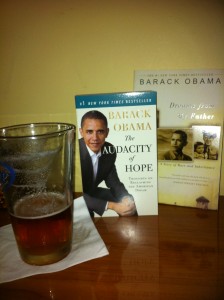 I’m reading Barack Obama’s first book: Dreams From My Father. My goal is to try and understand the man from his own perspective, his own words. There are a lot of people who have a lot of opinions of the man. I think that I owe it to him and myself to see what he has to say about himself.
I’m reading Barack Obama’s first book: Dreams From My Father. My goal is to try and understand the man from his own perspective, his own words. There are a lot of people who have a lot of opinions of the man. I think that I owe it to him and myself to see what he has to say about himself.
Chapter One:
The book begins with a college aged Obama living with his college roommate. Obama was 21 at the time and living in New York.
Right away I’m struck at the artistry of the story telling. Clearly the author is adept, even skilled, at the art of writing. The flow of the words into thoughts and thoughts into images is very well done. I won’t say powerful, it’s too early in the book to deliver a power punch, but it sets up the book nicely.
Concurrent with that artistry is the nice unexpected contrast. In a book that is about a man and his father, the story begins with Obama’s retelling of his hearing the news that his father had passed away. A phone call from a long lost aunt in a far away nation delivering news of a far away man. A far away man and his passing.
With that news, the book pivots into the history, albeit a brief and cursory one, of his father, his grandfather and grandmother. Barack Obama the elder grew up in Kenya and attended a school established by the colonial British. Having done there, the student was invited to attend University in the United States; Hawaii to be exact. From the opposite side, the book explores the journey of Barack’s maternal grandparents. Their journey from Kansas to the Army, from California to back to Kansas and then Texas finally moving to Seattle. Finally even Seattle gave way to the to final move to Hawaii.
There man and woman met, fell in love, got married and had a child.
Obama was born in Hawaii. He spent his very early years in Hawaii. However, not much is mentioned of those early days. More is focused on the refined older Obama. His British accent, his intelligence, his refined nature. Further, significant portion of the 1st chapter details the struggle of Obama’s grandparents confronting racism in some of the parts of their world. There is the story of the janitor at the bank weeping with sorrow. The story of Obama’s young mother playing with a black childhood friend and the conflict it created. The narrative almost creates this couple, the future grandparents, as a couple expecting that their daughter would meet and marry, then give birth to, a black man.
I was a little taken back at the memories, and how they were expressed, by that Obama; 21 in college in New York:
When the weather was good, my roommate and I might sit out on the fire escape and smoke cigarettes and study the dusk washing blue over the city, or watch white people from the better neighborhoods nearby walk their dogs down our block and let the animals shit on our curbs–
The Republican part of me wanted to latch onto that; to grab it and run with it. But I realized that life is full of the we’s and the they’s. I remember growing up and I knew the kids with money and the kids who had even less than we did. I remember. And it was a they and a we. I knew it then and it should be fair for a man who’s writing his story to relate to events in his life the same way.

I ordered this this afternoon. We can trade after reading, yes?
http://www.amazon.com/dp/0984544704/ref=cm_sw_r_fa_asp_-JN5D.17T2FEA
We can trade after reading, yes?
We can. If by trade you mean that I get your book and a six pack.
Haven’t read the book myself, but enjoyed your summary.
Haven’t read the book myself, but enjoyed your summary.
I wanna be fair; fair as I can be.
I re-read my summary. I’m too busy these days and I don’t proof read my stuff; it shows.
But thanks.
Thanks for trying to make your reading an honest engagement with the book, rather than just latching onto things you can magnify and exaggerate and profess umbrage about. I know the temptation. This is a fine summary, and your description of your reaction is good stuff too.
I’ll contradict myself in the next two sentences. First off, I don’t think that biography is the best & most important way to evaluate a candidate; rather, I think you have to look at the policies he’s pursued & what he proposes to do in office. Second, Obama’s incrementalism reminds me of Romney’s empiricism at Bain— when you’re black/Mormon, you’re gonna be an outsider in the Senate/high finance, so you wind up staking your claim on hard work and mastery of details rather than more debunkable, ephemeral Big Ideas.
wonderful summary of chapter one
wonderful summary of chapter one
Thanks.
Now I just have to finish the book 😉